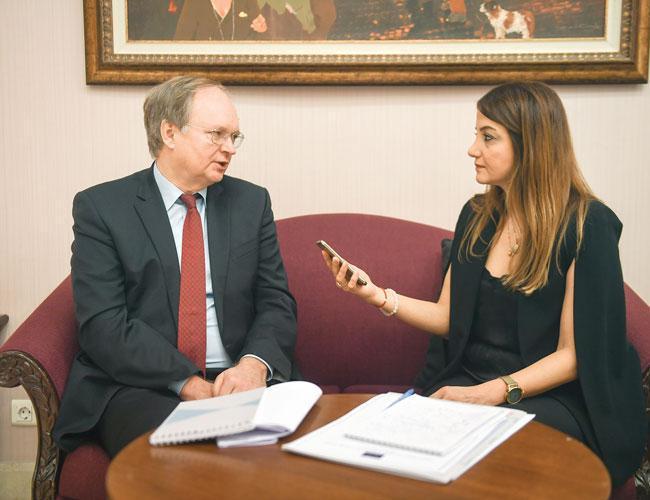
The head of the European Union delegation to Turkey ambassador Christian Berger has praised Turkey’s efforts to seek a resolution to the Syrian crisis both with and without Iran and Russia, adding that Brussels and Ankara agree on the fundamental principles in the policy on the war-hit country.
“We fully appreciate what Turkey is doing in the Astana process and in many other processes,” he told daily Hürriyet in an interview on Jan. 30.
“The most important fundamental principle here is we want to see a political solution in Syria. We fully appreciate what Turkey is doing in the Astana process and in many other processes. Turkey is working with Russia and Iran and also with the international community,” he added.
Berger said there would be a Syria conference organized in Brussels mid-March which Turkish Foreign Minister Mevlüt Çavuşoğlu will also be attending.
“We will focus on how to help the U.N. to push for a political solution in the country. It is important because this is linked to the refugee situation. And there, Turkey and the EU are certainly on the same line,” Berger said.
Berger said there are a number of meetings planned between the EU and Turkey in early 2019. “Next week, the Turkish transport minister will be in Brussels, there will be very important discussions on closing the gap for the transportation of goods between Asia and Europe. The second meeting will be on the aviation agreement. At the end of February, we will have a high level economic dialogue in Istanbul and there will be the European-Turkish Business Forum,” he said.
Highest level of engagement
Berger said there will be a meeting of the Association Council, the most important governing structure for the Association Agreement (Ankara Agreement) between Turkey and the EU, most likely in March.
“We will discuss all issues in this forum. We had a leaders’ meeting in Varna hosted by the Bulgarian Presidency last year. A similar meeting could happen this year. We believe that, both on the Turkish side and on the European side, the highest level of engagement is useful and necessary,” he added.
“As European Commission President Jean-Claude Juncker keeps saying, we want to see a democratic, stable and secure Turkey.
Turkey is a candidate country and we want to have Turkey as a very strong partner. We have no interest in seeing economic problems, security problems, etc. in Turkey because it will also affect us. Our relationship is based on that. We have a very strong interest in having a very strong relation with Turkey,” Berger said.
When asked about the accession process between the Turkey and the EU, Berger said the accession talks between the EU and Turkey have stopped a while ago for a number of reasons. “What I see is, in 2019, important work will be done in some of the issues that have come up. The Turkish government has reconstituted the ‘Reform Action Group’ which met in August and December. They are now discussing a reform of the judiciary, the human rights action plan and many other things. We need to see what the outcome is going to be,” he added.
Berger mentioned that there were scores of changes set to happen within the 2019 calendar. “In 2019, we have local elections in Turkey and we have European Parliament elections in Europe, and there will be a new European commission coming up in November. So there will be a new president of the European Council, there will be a new president of the European Parliament, many other people will change. But we need to continue the dialogue,” he said.
On the visa liberalization issue, Berger said they announced that the biometric passport benchmark was complete when the Reform Action Group met.
“There are some other benchmarks that need to be discussed. The technical talks are continuing,” he added.
400 million euros for Syrian children in Turkey
On the situation of the Syrian children in Turkey, Berged said: “I am happy to repeat how much we appreciate the way Turkey is handling the situation with the refugees. Our appreciation is there but also our support is there. This is about 3 billion euros that we started to spend in 2016 and 2017. And last year, on the basis of the agreement between the EU and Turkey, there will be another 3 billion. We have just finished this, discussing with Vice President Fuat Oktay’s office. How to spend this money, which areas to focus on, etc. And we all agreed that education is the most important work we can do here… You need to keep kids off the streets, you need to keep them in the school and you need to give them a perspective. And perspective can only come with proper education. Language training is one of the priorities. So under the branch of the second three billion euros, a project of 400 million euros is exactly focusing on language training and teacher training. In addition to that, we will provide another 100 million euros for school building and infrastructure. We also know the burden over the health system. We will very soon build two hospitals, one in Kilis and one in Hatay.”